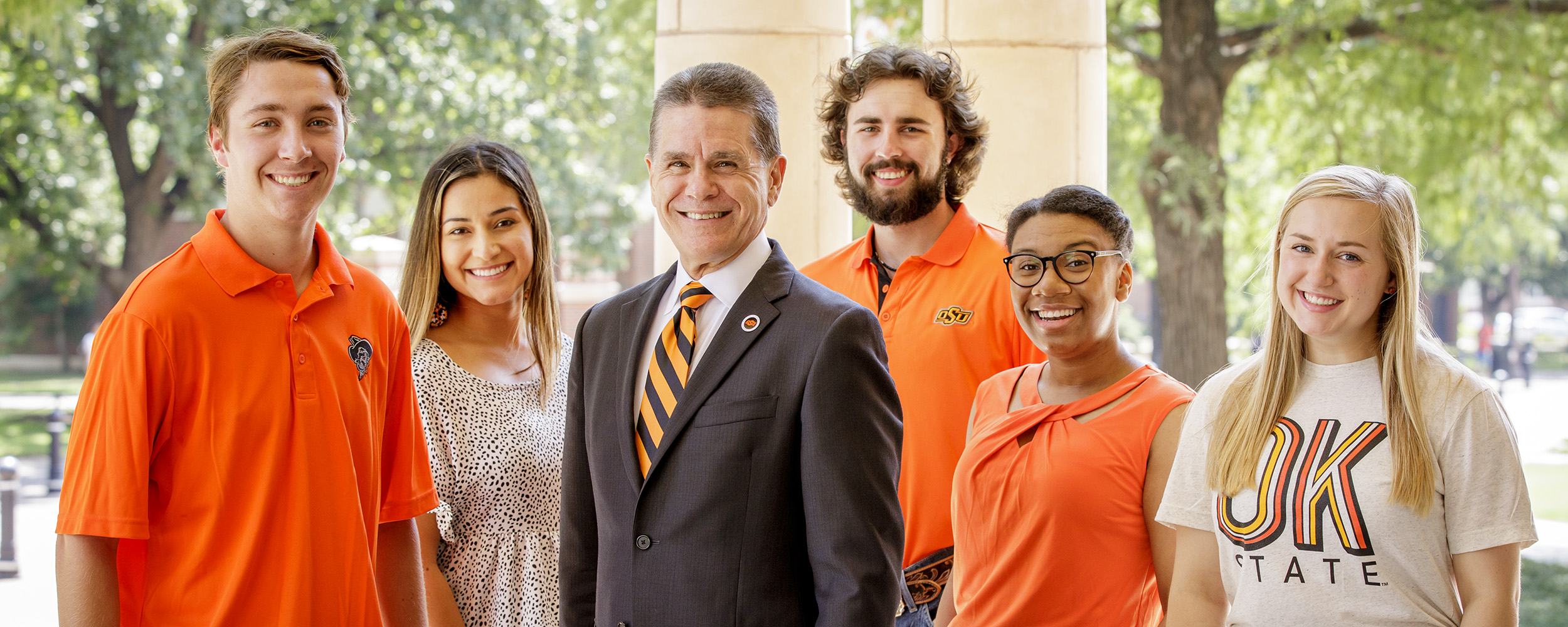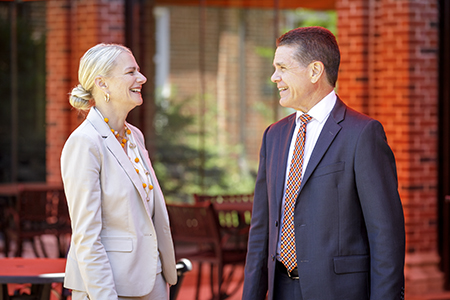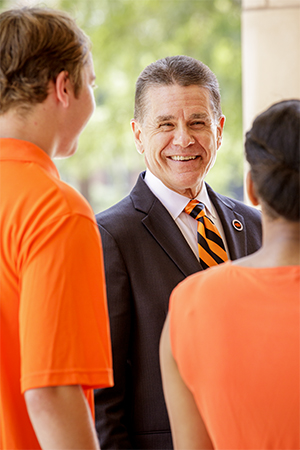
A Vision for Transformation: Dr. Pedersen speaks about the future
Thursday, November 4, 2021
Media Contact: Christy Lang | Marketing and Communications Manager | 405-744-9740 | christy.lang@okstate.edu
Dr. Jon E. Pedersen arrived in Stillwater this past summer, brimming with energy and excitement about the future of the new College of Education and Human Sciences that he’s now leading.
Pedersen joined the Cowboy family following five years as dean of the University of South Carolina’s College of Education. He has more than 30 years of experience as a faculty member and administrator, including appointments at the University of Nebraska-Lincoln, the University of Oklahoma, East Carolina University and the University of Arkansas- Fayetteville.
 As a leader, Pedersen promotes interdisciplinary collaborations and partnerships among universities, schools and communities, leveraging the assets and treasures of higher education institutions with a focus on developing the whole person and transforming communities. As he began his first academic year as dean, Pedersen sat down with us to share his values, leadership philosophy, what attracted him to Oklahoma State University and his vision for the future.
As a leader, Pedersen promotes interdisciplinary collaborations and partnerships among universities, schools and communities, leveraging the assets and treasures of higher education institutions with a focus on developing the whole person and transforming communities. As he began his first academic year as dean, Pedersen sat down with us to share his values, leadership philosophy, what attracted him to Oklahoma State University and his vision for the future.
What are your initial impressions of Stillwater?
My wife, Conni, and I were driving down Sixth Street and almost simultaneously we
said, “This feels like home.” And it really does. Broadly speaking, the people — whether
it’s our neighbors, people on campus, certainly everyone within the college — have
been so warm and welcoming and really made us feel part of the Cowboy family. We certainly
don’t take that lightly, and it’s very important to us.
Your roots are in agriculture and education. Can you tell us what led you to become
a science teacher and then into higher education?
I’m from a very rural part of eastern Nebraska. I went to a one-room school, graduating
at the top (and bottom) of my class. Growing up on a farm, I had that focus on agriculture.
I went to the University of Nebraska. When I was growing up, it was never a question
of whether we’d go to college. My brother, sister and I were first-generation college
students. There was also no question about where I would go (to college). I got into
agriculture, specifically animal sciences. I love the sciences and all aspects of
what I did as an undergraduate — anatomy, physiology, vet med, parasitology.
After graduating, I worked for Land O’Lakes, the company that makes butter, dairy and animal nutrition products, on the animal side in central Nebraska. I soon discovered there was a part of my job that I loved and a part I didn’t like so much. I didn’t like the sales part so much; what I really loved was the teaching. I told my wife, “I really want to go back and be a teacher.” And I did. I ended up teaching chemistry and physics. That’s how I ended up in education, and I have loved every minute of it.
From a teaching perspective, we never know how much we impact our students. It’s the same for many professions, whether it is our clients or our colleagues. I experienced this as both a teacher and a student. I do have stories of students who came back and told me, “You changed my life.” And there was a professor who did that for me. He was an educational psychology professor. He really encouraged me to go and get a master’s degree and then a Ph.D. He was a great influence for me and my life, personally and professionally.
What drew you to serve and lead as an administrator?
Initially, I never thought I’d be an administrator. The opportunities sought me out.
In my first position as an associate dean — I really hadn’t considered it until a
number of people came to me and said you ought to apply. So I did. I really enjoy
what I do.
I was a teacher because I wanted to impact children and young adults. I realized that I was teaching 100-120 kids a year. If I educate 10 teachers a year, who then teach 120 kids a year, I continue to grow my impact. As an administrator, if I can influence a number of faculty and help shape a direction for a college, then all of those faculty, all of those students we impact across so many different disciplines, then my impact could be even greater.
I’ve always said that I think the best leaders are those who have never said, “I want to be the dean, provost, the president.” What they have said is, “I want to make a difference.”
“I want to leave my career in a way in which I’ve done everything I can to really change and transform human lives.”
- Dr. Jon Pedersen, Dean, College of Education and Human Sciences
Why the OSU College of Education and Human Sciences?
Anytime I’ve ever moved somewhere, I have always gone to a place, rather than leaving
a place. It’s a collective decision for my wife, Conni, and me, and we have to agree
that it is great for us. There’s that personal component and the professional side.
Professionally, I have a firm belief that my life should be dedicated to change. Transforming human lives cannot be done through a singular focus within a discipline. For a child or an adult, my goal is to say, “How do we improve their lived experience?” When you look at Oklahoma State and the new College of Education and Human Sciences, the breadth of what this college does really covers birth through aging. It’s about early childhood and PK-12 education. It’s nutritional health, mental health and physical health. It’s about improving lives on a daily basis through textiles, the whole realm of merchandising, fashion and interior design. It’s about job creation and preparing professionals like pilots.
That’s why this alignment among these schools and departments, the diversity we have, is so important to me. We are about the human experience. People. Passion. Purpose.
I want to leave my career in a way in which I’ve done everything I can to really change and transform human lives. Here’s a college that is so well aligned. It is expansive, and we can make transformational changes to the human experience.
You mentioned that the diversity of programs in the college is important. How is that
diversity a strength? Nationally, you don’t see institutions or similar colleges pulling together and collaborating
the way in which I see this college really stepping up and saying this is what we
want. There are programs nationally doing smaller work within isolated communities
but they have not taken that opportunity to look at the totality of the time, talent
and treasure within a college to really go out and make that difference.
Nationally, you don’t see institutions or similar colleges pulling together and collaborating
the way in which I see this college really stepping up and saying this is what we
want. There are programs nationally doing smaller work within isolated communities
but they have not taken that opportunity to look at the totality of the time, talent
and treasure within a college to really go out and make that difference.
That’s where this is so exciting. I think we’re on the precipice of this wonderful new world of who we are as a college, a group of professionals working together for the common good of humans. [Our work] makes a difference in people’s lives. It saves lives. It saves families and children. We are changing communities. That gives me goosebumps.
As you think about the path forward, what is your vision?
I see this College of Education and Human Sciences as a leader nationally and internationally.
We have that capacity. We have that strength within the knowledge, skills and dispositions.
Together, we are unique in our approaches in addressing the human experience. That
puts us on a map for the excellent work we are doing and will continue to do.
What do you like to do in your spare time?
My wife and I like downtime, time at home, sitting on the patio, just relaxing and
talking. We’re very much homebodies. We do love to see our daughter when we can and
to see family in Nebraska.
I run and do some weight training. I want to be healthy and for me, exercise has a purpose, to train my body for skiing. I love to downhill ski. I started when I was about 17. About an hour from my hometown, there is a small ski area called Mount Crescent on the Missouri River and that’s where I learned. I love the mountains and was a ski patroller for a time.
DR. JON E. PEDERSEN
Dean, College of Education and Human Sciences
Professor, School of Teaching, Learning and Educational Sciences
University of Nebraska at Lincoln
Ph.D., Science Education — Curriculum and Instruction, 1990
M.Ed., Curriculum and Instruction, 1988
B.S., Agriculture-Animal Nutrition, 1982
Certificates
Riley Institute-Furman University’s Diversity Leadership Institute, 2019
Colonial Life Education Leadership Experience, 2018
Harvard University’s Institute for Educational Management, 2018
Harvard University’s Management Development Program, 2014
Story By: Christy Lang | ASPIRE Magazine
